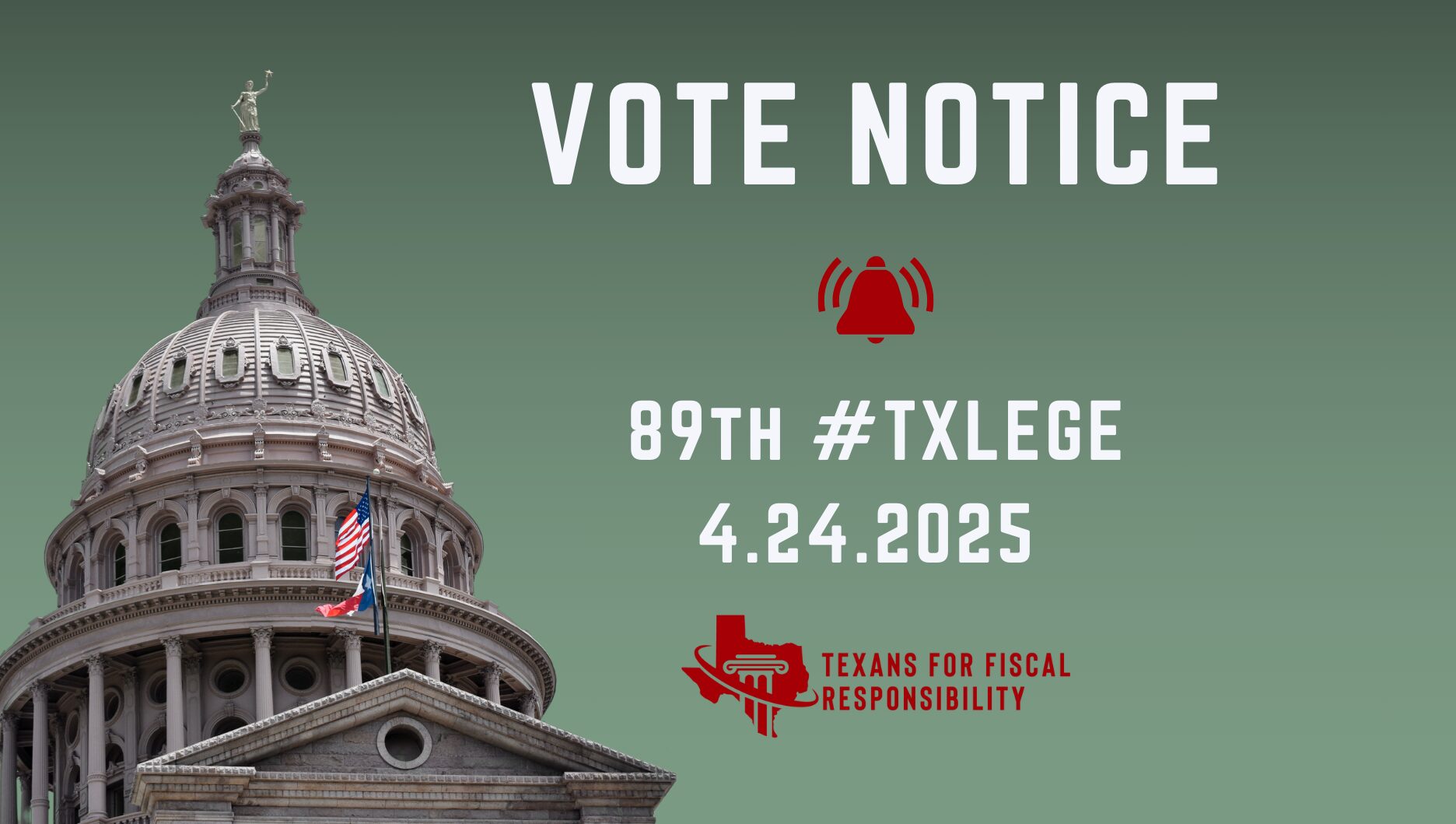
Texans for Fiscal Responsibility has issued the following vote notice for April 24th, 2025
Texas House of Representatives
Subject: House Bill 29 (HB 29) – Municipal water system waste
- Author: State Rep. Stan Gerdes (R-Smithville)
- Caption: Relating to water losses reported by certain municipally owned utilities to the Texas Water Development Board; authorizing administrative penalties.
- TFR Position: SUPPORT
- Background:
- HB 29 introduces accountability measures for large city-run water utilities that are losing significant volumes of water due to infrastructure inefficiencies. It ensures these utilities validate their water loss data and develop a practical, goal-oriented plan to address and reduce waste. With Texans increasingly concerned about water scarcity and taxpayer-funded infrastructure, this bill provides transparency and encourages fiscal responsibility. It prevents utilities from perpetually neglecting maintenance while still charging ratepayers for unrecoverable water. By requiring concrete timelines and performance metrics, the bill ensures public resources are managed more efficiently.
Subject: House Bill 125 (HB 125) – New taxpayer funded medical school
- Author: State Rep. Shelby Slawson (R-Stephenville)
- Caption: Relating to the creation of the Tarleton State University College of Osteopathic Medicine.
- TFR Position: OPPOSE
- Background:
- HB 125 proposes establishing a new publicly funded osteopathic medical school under Tarleton State University. While the intent is to address physician shortages in rural areas, the legislation initiates a costly expansion of state-supported higher education. It commits taxpayers to an estimated $25 million in upfront funding during the next biennium, with projections nearing $38 million annually soon there after, significantly increasing government spending. The bill duplicates programs already offered by existing medical institutions in Texas, raising concerns about unnecessary bureaucratic growth and diluted resources. Rather than expanding administrative overhead, targeted reforms for rural physician placement or improving efficiency within existing schools would offer more prudent, taxpayer-friendly solutions. This proposal exemplifies government growth without clear guardrails on effectiveness or long-term financial accountability, burdening taxpayers for an initiative that may not even deliver the desired results.
Subject: House Bill 796 (HB 796) – State nullification of Federal Acts
- Author: State Rep. Cecil Bell Jr (R-Magnolia)
- Caption: Relating to the Texas Sovereignty Act.
- TFR Position: SUPPORT
- Background:
- HB 796 would strengthen Texas’ constitutional sovereignty by establishing a formal legislative process to review and reject federal actions that exceed constitutional limits. A new joint committee of state lawmakers would assess federal mandates, regulations, and court rulings to determine if they violate the U.S. Constitution. If approved by both chambers and the governor, such actions would be declared null in Texas and unenforceable by state agencies. The bill protects taxpayers by prohibiting the use of state funds or resources to implement federal mandates that the state determines are unconstitutional. This safeguards Texas from federal overreach, ensuring that limited government principles and state autonomy are preserved. The bill reinforces original constitutional interpretation and respects the intent of the framers.
Subject: House Bill 1285 (HB 1285) – Expands Agency Drone Use
- Author: State Rep. Charlie Geren (R-Fort Worth)
- Caption: Relating to inspections and examinations by the Railroad Commission of Texas of certain sites and facilities conducted using unmanned aircraft.
- TFR Position: OPPOSE
- Background:
- HB 1285 authorizes the Railroad Commission of Texas to use drones to inspect oil and gas facilities, pipelines, and surface mining sites, significantly expanding the agency’s aerial surveillance powers. While framed as a tool to improve regulatory efficiency, the bill raises serious concerns about government overreach and the erosion of property rights and privacy. Drones operated by state regulators may inadvertently capture images of neighboring private property, yet the bill provides no safeguards governing how such data is handled. There are no statutory protections to limit what images can be collected, how long they can be stored, or who they can be shared with — leaving the door open to misuse or unauthorized data retention. This lack of oversight is especially troubling given the expanding role of state surveillance technologies. From a limited-government perspective, HB 1285 sets a dangerous precedent by empowering unelected bureaucrats with warrantless, largely unregulated surveillance tools. And from a taxpayer standpoint, the bill could lead to increased agency spending on drone equipment, training, and data systems, with no accountability for costs or privacy protections.
Subject: House Bill 1238 (HB 1238) – Streamlines injection well inspections
- Author: State Rep. Ryan Guillen (R-Rio Grande City)
- Caption: Relating to the inspection of the location of a proposed Class I injection well.
- TFR Position: SUPPORT
- Background:
- HB 1238 removes unnecessary bureaucratic delays in the permitting process for Class I injection wells by allowing licensed Texas engineers and geoscientists to perform required inspections. By authorizing professionals outside the Texas Commission on Environmental Quality (TCEQ) to conduct these reviews—either on-site or remotely using advanced mapping tools—this bill reduces strain on agency staff and helps avoid costly delays for businesses. This helps to ensure taxpayer-funded agency resources are better allocated to high-risk or high-need projects. It encourages private-sector involvement and innovation in environmental compliance, limiting unnecessary government interference in routine permitting.
Subject: House Bill 2003 (HB 2003) – High-speed Rail transparency
- Author: State Rep. Cody Harris (R-Palestine)
- Caption: Relating to provision to the Texas Department of Transportation of information regarding certain high-speed rail projects.
- TFR Position: SUPPORT
- Background:
- HB 2003 requires developers of high-speed rail projects to submit annual updates to the Texas Department of Transportation while their projects remain under state consideration. These updates must include financing plans, construction schedules, projected ridership, and foreign investment disclosures. The goal is to ensure transparency, particularly for landowners affected by eminent domain threats from long-stalled rail plans. By mandating public disclosure online, the bill gives taxpayers, investors, and property owners insight into the viability and status of costly rail proposals. This limits the potential for speculative or inactive projects to hold property hostage without scrutiny. HB 2003 promotes accountability, prevents misuse of eminent domain authority, and ensures that public infrastructure plans do not become boondoggles or vehicles for foreign influence.
Subject: House Bill 2249 (HB 2249) – Costly new teacher scholarship program
- Author: State Rep. Diego Bernal (D-San Antonio)
- Caption: Relating to the establishment of the Texas Teacher Recruitment Scholarship Program.
- TFR Position: OPPOSE
- Background:
- HB 2249 creates a taxpayer-funded scholarship program offering up to $40,000 to students who agree to teach in public or charter schools after graduation. While attempting to address teacher shortages, the proposal introduces a massive new recurring government expense, projected to cost taxpayers over $114 million annually within five years, growing government spending during a time when Texas should be prioritizing broad-based tax relief. Its reliance on state administration also adds new government bureaucracy, with 5 additional state employees needed. This bill substantially grows the size and scope of government and should be opposed.
Subject: House Bill 3228 (HB 3228) – Renewable waste disposal standards
- Author: State Rep. Stan Lambert (R-Abilene)
- Caption: Relating to the inclusion of recycling or disposal provisions in certain lease agreements of wind or solar power facilities.
- TFR Position: SUPPORT
- Background:
- HB 3228 strengthens property rights by requiring wind and solar energy companies to fully account for the cleanup of their facilities when they are no longer in use. This includes not just removing structures but also recycling or safely disposing of all components—hazardous or otherwise—in accordance with the law. Importantly, companies must provide financial guarantees up front to ensure landowners are not left footing the bill. These costs are to be reviewed by an independent engineer every five years, keeping the estimates current and the funds adequate. This approach avoids taxpayer-funded cleanups. It promotes environmental accountability while protecting landowners’ property and reducing future government intervention.
Subject: House Bill 3240 (HB 3240) – New geothermal energy government council
- Author: State Rep. R.D. Guerra (D-Mission)
- Caption: Relating to the establishment of the Texas geothermal energy production policy council.
- TFR Position: OPPOSE
- Background:
- HB 3240 establishes a new government advisory council within the Railroad Commission to study geothermal energy development and recommend state policy changes. This bill represents another instance of government initiating industry-specific planning that may lead to future subsidies or regulations. The council is tasked with evaluating tax incentives and federal partnerships—tools often associated with market interference rather than innovation. Though no compensation is provided to council members, the administrative burden still falls on taxpayers. A more limited-government approach would focus on eliminating barriers for energy sources, not setting up new government structures. This bill risks growing bureaucracy and distorting the energy market under the banner of long-term planning.
Subject: House Bill 2798 (HB 2798) – Government regulates crypto kiosks
- Author: State Rep. Mihaela Plesa (D-Dallas)
- Caption: Relating to disclosures and other requirements concerning virtual currency kiosk transactions; authorizing a fee.
- TFR Position: OPPOSE
- Background:
- HB 2798 imposes significant new mandates on operators of virtual currency kiosks in Texas, including broad disclosure requirements and consumer transaction limitations. Most notably, the bill caps first-time users, even if they are willing and able to engage in larger transactions. This arbitrary limit restricts consumer freedom and interferes with voluntary financial decisions, setting a dangerous precedent for government micromanagement of private economic activity. While the bill purports to prevent fraud, it does so by treating all new users as potential victims, rather than empowering them with education and personal responsibility. The bill grows state regulatory power by expanding the role of the Department of Banking and authorizing it to levy fees, inspect businesses, and issue rules. While the consumer warnings and disclosures are arguably good, HB 2798, overall, undermines free-market principles, erodes consumer autonomy, and invites future overreach into digital finance.
Subject: House Bill 107 (HB 107) – Sickle cell disease registry
- Author: State Rep. Lauren Simmons (D-Houston)
- Caption: Relating to the establishment of the sickle cell disease registry.
- TFR Position: OPPOSE
- Background:
- HB 107 requires the state to create a centralized registry tracking all individuals diagnosed with sickle cell disease in Texas. While aimed at improving treatment and research, the bill mandates that hospitals and clinics report patient data, creating a new regulatory burden. The registry is expected to cost nearly $5 million in the first two years and add at least five new full-time government employees. It also sets a precedent for disease-specific registries that could lead to further government overreach and spending. Although privacy protections are mentioned, there is no robust enforcement mechanism for data security, leaving personal health information potentially vulnerable. This is not a core function of government and shifts focus away from empowering free-market solutions, patients, and reducing healthcare costs.
Texas Senate
Subject: Senate Bill 401 (SB 401) – Homeschool UIL participation
- Author: State Sen. Angela Paxton (R-McKinney)
- Caption: Relating to participation by non-enrolled students in University Interscholastic League-sponsored activities.
- TFR Position: SUPPORT
- Background:
- SB 401 improves access for homeschool students to participate in UIL competitions like sports or academic contests. By letting families access opportunities in nearby districts when their home district opts out, the bill reduces barriers without forcing participation. This streamlined approach avoids new spending and respects educational freedom. It’s a pro-family measure that avoids expanding government while increasing opportunities.
Subject: Senate Bill 407 (SB 407) – Medical freedom rights
- Author: State Sen. Mayes Middleton (R-Galveston)
- Caption: Relating to a health care facility’s required policy for vaccine preventable diseases.
- TFR Position: SUPPORT
- Background:
- SB 407 strengthens individual rights by requiring health care facilities in Texas to accept vaccine exemption requests based on personal or religious beliefs. It ensures that employees are not coerced into receiving vaccines against their conscience, protecting religious liberty and personal autonomy. The bill removes discretion from bureaucrats and shifts authority back to individuals. By eliminating the power of health institutions to deny exemptions, it guards against workplace discrimination rooted in medical mandates. It also provides predictability and uniformity in exemption policies across the state, removing arbitrary or politically driven policy enforcement. The bill defends core constitutional principles without expanding programs or increasing spending.
Subject: Senate Bill 467 (SB 467) – Temporary exemption for fire loss
- Author: State Sen. Angela Paxton (R-McKinney)
- Caption: Relating to a temporary exemption from ad valorem taxation of the appraised value of an improvement to a residence homestead that is completely destroyed by a fire.
- TFR Position: SUPPORT
- Background:
- SB 467 helps homeowners who lose their home to fire by temporarily reducing their property taxes for the remainder of the year. Instead of being taxed on the full value of a destroyed home, the tax bill will be reduced to reflect the time it no longer exists. This avoids unfairly taxing families on property they can no longer use or live in. The bill requires a simple application process and ensures timely reassessment and refunds if overpayment occurred. By setting a clear deadline and relying on local and insurance-based information, it prevents delays or abuse. This respects property rights, and is a targeted reform that provides relief without increasing government costs.
Subject: Senate Bill 506 (SB 506) – Protects voter-driven proposition integrity
- Author: State Sen. Paul Bettencourt (R-Houston)
- Caption: Relating to requirements for certain petitions requesting an election and ballot propositions and to related procedures and provisions.
- TFR Position: SUPPORT
- Background:
- SB 506 ensures that ballot language in citizen-led elections is fair, clear, and not misleading, by establishing a uniform process for local propositions. It gives the Secretary of State and courts oversight to prevent deceptive or confusing language that could manipulate voter intent. By doing so, it protects the rights of citizens and taxpayers who are increasingly relying on ballot initiatives to challenge government overreach. This bill also restricts local governments from hijacking the process by placing conflicting measures on the same ballot, a tactic often used to dilute grassroots efforts. By cutting down on unnecessary legal challenges and re-elections caused by vague or biased language, it can help save taxpayer dollars. It also prevents repeat offenders from bypassing reform by forcing oversight for up to four years after a court violation.
Subject: Senate Bill 1181 (SB 1181) – Expands regulation of sports
- Author: State Sen. Carol Alvarado (D-Houston)
- Caption: Relating to the regulation of combative sports by the Texas Department of Licensing and Regulation; creating a criminal offense.
- TFR Position: OPPOSE
- Background:
- SB 1181 expands state regulation of combative sports by removing exemptions, tightening licensing requirements, and adding criminal penalties for non-compliance. While framed as improving safety and accountability, the bill increases bureaucratic control by requiring promoters to seek prior government approval for each event, placing a burden on small and independent operators. The addition of a criminal offense for unapproved promotions raises severe concerns about over-criminalization of private enterprise, where civil or financial penalties would surely suffice. The bill unnecessarily grows the reach of the Texas Department of Licensing and Regulation and imposes barriers to entry in a niche industry.
Subject: Senate Bill 1845 (SB 1845) – Protects Texas from foreign influence
- Author: State Sen. Bryan Hughes (R-Mineola)
- Caption: Relating to the registration as a lobbyist of persons who engage in certain lobbying activities on behalf of a foreign adversary and to prohibitions on the receipt of compensation related to those lobbying activities; providing a civil penalty.
- TFR Position: SUPPORT
- Background:
- SB 1845 strengthens Texas’s ability to resist foreign influence by requiring lobbyists who advocate on behalf of hostile foreign governments or their affiliates to register, regardless of how much money is involved. It removes financial thresholds that previously allowed some foreign-affiliated actors to evade registration. The bill outright bans these lobbyists from being paid—either in cash or perks—by foreign adversaries. This closes dangerous loopholes that could let foreign regimes buy access to Texas lawmakers. It empowers the Attorney General to seek court orders to stop violations and impose meaningful civil penalties. This law ensures foreign entities cannot manipulate Texas policy through unregulated lobbying.
Subject: Senate Bill 2004 (SB 2004) – Taxpayer subsidies for car races
- Author: State Sen. Phil King (R-Weatherford)
- Caption: Relating to the eligibility of the INDYCAR Grand Prix of Arlington for funding under the major events reimbursement program.
- TFR Position: OPPOSE
- Background:
- SB 2004 would add the INDYCAR Grand Prix of Arlington to the list of events eligible for taxpayer-funded reimbursements under the Major Events Reimbursement Program. This effectively allows more public funds to subsidize private entertainment events under the promise of economic development. It further weakens existing eligibility rules by permitting funding even when there is no competitive site selection process—removing a key safeguard meant to prevent cronyism. This bill represents corporate welfare: it reallocates public dollars away from core services and toward entertainment subsidies. Expanding such carve-outs erodes the principle of fair and limited government. Lawmakers should focus on reducing the tax burden broadly instead of using public funds to benefit private sports promoters.
Subject: Senate Bill 2722 (SB 2722) – Toll revenues
- Author: State Sen. Paul Bettencourt (R-Houston)
- Caption: Relating to the use of certain tolls and charges imposed by certain counties; authorizing a civil penalty.
- TFR Position: OPPOSE
- Background:
- [UPDATED] While SB 2722 does include some positive reforms by curbing the diversion of toll revenues to unrelated projects, the bill also formalizes the indefinite collection of tolls, even after original construction costs and debts have been fully repaid. Instead of requiring tolls to end once obligations are met, the bill repurposes surplus revenues for ongoing county and municipal expenses, creating a structural reliance on continuous tolling. This shifts tolls from a temporary financing tool to a permanent funding source without clear limits. Although the bill blocks wasteful spending on non-road items, it ultimately entrenches toll roads as a long-term revenue strategy. Taxpayers and drivers are left paying endlessly for infrastructure that should have already been paid off. In codifying this framework, the bill effectively guarantees tolls will never go away. For conservatives who believe in limited government and protecting taxpayers from creeping, permanent taxation mechanisms, this bill raises serious concerns despite its surface-level accountability reforms. For these reasons, TFR has revised its position to oppose.
Subject: Senate Bill 2753 (SB 2753) – Streamlines voting procedures statewide
- Author: State Sen. Bob Hall (R-Edgewood)
- Caption: Relating to the integration of early voting by personal appearance and election day voting, including the manner in which election returns are processed and other related changes.
- TFR Position: SUPPORT
- Background:
- SB 2753 overhauls Texas election procedures by consolidating early voting and Election Day into a single, streamlined in-person voting period. It eliminates inefficient overlaps between early and Election Day voting and ensures all ballots are processed under a consistent framework. The bill reduces unnecessary administrative burdens and costs by repealing the countywide polling place program and replacing it with locally-assigned Voting Centers, ensuring better oversight and less equipment duplication. It also tightens mail-in voting eligibility to limit abuse, helping restore voter confidence and security in elections. By repealing outdated parts of the Election Code, the bill simplifies procedures and improves accountability. The standardized timeline reduces government overhead and improves transparency in election results reporting. These changes reduce government sprawl in election administration and protect taxpayer resources while making the voting system more secure and efficient. Overall, the bill supports election integrity and curbs bureaucratic excess.
Reminder: Vote Notices are provided to both Texas state lawmakers and the general public, sharing Texans for Fiscal Responsibility’s position on issues to be rated as a part of the Fiscal Responsibility Index. Notices are provided prior to votes being taken in each legislative chamber.
Disclaimer: We reserve the right to consider amendments to legislation that may be introduced without notice as a part of issues to be rated on the Fiscal Responsibility Index. We will make every effort to provide notice on amendments that are pre-filed.




